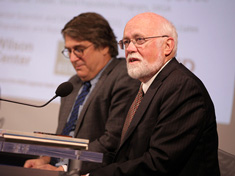-
William Butz: Investment in Human Capital, Not Engineering, Central to Climate Resilience
December 5, 2014 By Sarah Meyerhoff
“How does climate change affect people by age and sex, and where they live?” asks William Butz, director of coordination and outreach at the Wittgenstein Center for Demography and Global Human Capital, in this week’s podcast. “And how to do they respond? How do they adapt or fail to adapt?”
“How does climate change affect people by age and sex, and where they live?” asks William Butz, director of coordination and outreach at the Wittgenstein Center for Demography and Global Human Capital, in this week’s podcast. “And how to do they respond? How do they adapt or fail to adapt?”
Education equips people to bounce back more quickly after disasters occurMost climate research and policy is focused on emissions rates and the physical effects of climate change, overlooking the idea of differential vulnerability – that individuals may have different levels of vulnerability in the wake of extreme weather events based on their age, gender, location, socioeconomic status, or level of schooling, says Butz. Of these characteristics, scientists know the least about the effects of education.
To fill that gap, the Wittgenstein Center commissioned 11 studies, published in a special issue of Ecology and Society last March, that explore the relationship between educational attainment and adaptive capacity in a number of low- and middle-income countries. The Wittgenstein Center released the studies in conjunction with a larger research effort on the effect of education on countries’ population growth, public health, and development trajectories.
Each study examines a different natural disaster and how individuals, households, communities, and countries responded to it, says Butz. Together, they demonstrate that education enhances resilience on each of these scales, he explains.
Smarter Decisions
Education generally mitigates the severity of disasters based on how it affects life decisions and trajectories. In aggregate, individuals who are better educated are less likely to live in high-risk areas or rely heavily on local natural resources for their livelihoods, Butz says. They are also better able to understand disaster preparedness plans and information about risk.
“Investment in human capital, through schooling and through health…moves wherever people move”
Additionally, education equips people to bounce back more quickly after disasters occur, he explains. The studies demonstrate that those with more education are at lower risk for mortality and malarial infection and tend to recover more rapidly from traumatic stress. They are also less prone to adopting coping strategies that reduce human capital investment, like taking their children out of school.
As leaders try to hammer out a global climate deal at the COP-20 in Lima this week and COP-21 in Paris next year, they will debate how billions of dollars in adaptation financing should be allocated in the coming decades. Directing funding mostly towards place-specific infrastructure, as many observers expect them to, would be a mistake, Butz says.
“Our data suggests that some substantial part of that should instead be redirected to investment in human capital through schooling and through health, which moves wherever people move and is shown to increase their resilience and increase their capacity to react.”
William Butz spoke at the Wilson Center on October 23.
Friday podcasts are also available for download on iTunes.
 A Publication of the Stimson Center.
A Publication of the Stimson Center.




